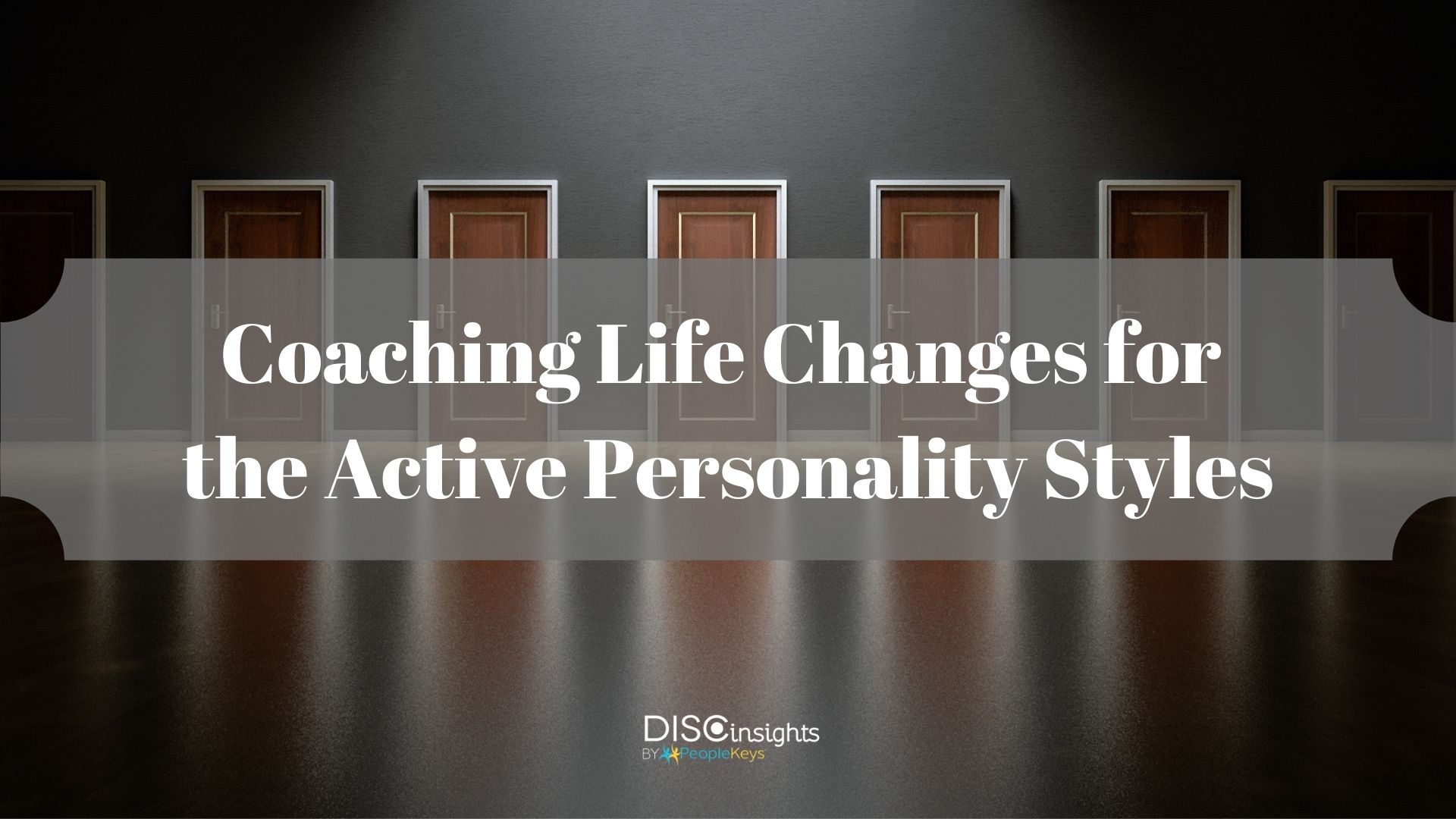- SHOP BY PRODUCT
- DISC TRAINING & CERTIFICATION TOOLS
- DISC RESOURCES
- BLOG
- SHOP BY PRODUCT
- DISC TRAINING & CERTIFICATION TOOLS
- DISC RESOURCES
- BLOG
- ALL ITEMS



It’s not always easy to adapt to change, especially if it’s all happening at once. Sometimes change can be overwhelming. There’s no guidebook as to how our lives are going to change every step of the way, and there’s no deadline to prepare for. This is a moment many people turn to a life coach or a behavioral consultant to guide them through and support transition. There are a lot of guidelines coaches implement to help handle transitions and support their clients from point A to point B. Let’s see how a coaching professional can best utilize the personality approach to guide change.
DISC Theory, developed by Dr. William Marston, provides the right tools for successfully unlocking one’s potential, including the ability to handle change. The four major DISC personality styles are divided into two categories, either Active or Passive, based on how they handle change and challenges. Whether it’s taking a more active role as a leader or becoming more organized to deal with the situations we are faced, understanding personality traits and how each one specifically reacts under pressure, will help you support your client’s management of the change happening within their own life’s journey. Let’s take a look how this applies to the Active personality styles – “D” and “I” styles.
Interestingly enough, “Ds” are actually motivated by problem-solving and the freedom from conformity. They thrive in challenging environments, hate routines and are very task-oriented. A dominant “D” style’s life coaching plan needs to have the big picture in mind and offer achievable steps with tasks to complete for each. Don’t forget that “Ds” fear being taken advantage of and can react aggressively if they think someone is out to do so. They need to be made aware and cautious of their own actions in such a way it doesn’t prevent them from progressing within ever-changing environments. While direct and able to process crisis quickly, when you guide them through a change, have in mind this style may tend to ignore risks and act a little immaturely. As their trusted life coach, make sure you help them see the pros and cons of every situation, and let them make the final decision on how to proceed as they want to feel in control.
What’s more, “D” style personalities tend to take on too many new projects out of excitement for the future, working ahead based on what could be in the near future. At times, this means overlooking the fine details, whether they have them all or not. They don’t like owing others and want to do everything themselves. While working with a “D” personality through a life change can be easy for a life coach, as they’re very self-motivated, you need to help them understand that spreading their energy in too many directions can halt innovation and sway progress. Have in mind, without progress, “Ds” can become disinterested, dissatisfied and dismissive before their goal comes to an end. They need to avoid doing this by keeping their focus on what’s most important.
Fearing rejection and the loss of approval from higher-ups, “I” personalities tend to wing new situations while combating challenges headed their way. Similar to “Ds,” they take on too many projects and tend to make too many promises without battling existing problems currently standing in their way. While they are effective at juggling multiple situations at once, they tend to overlook the details. As a life coach, help them admit they need to take a step back and prevent them from overworking themselves, which may lead to burnout. Many “I” styles will over-promise or fake their enthusiasm on a development plan, but have in mind they become unreliable when meeting deadlines and schedules, so you may need to give them more reminders and follow-up to keep them on track.
Easily distracted, “I” styles can lose the concentration necessary to get from point A to point B quickly. When overwhelmed, they can shut down, interrupt others or just not listen actively to what they are told. Help your “I” client by guiding them to become inspirational to others – this is where they thrive. They turn into a “a phoenix rising” and will pursue to overcome any challenge this way.
“I” personalities benefit from their investment in others, as they are very people-oriented. They realize people are possibly the best investment they have. Because they don’t say “no” easily, others tend to have their backs and take up the slack when they fall short. Make sure they involve a support circle on the path to their life change, and be ready to coach the whole team around them. Teamwork helps them gain control of each situation, as others will help the “I” to be accountable for steps taken towards the end result. They hate practicality and enjoy freedom from rules and regulations, which means they will find peace in knowing someone else will handle the nitty gritty while they focus more on taking action.
As a life coach you can help people reach their full potential and overcome obstacles life throws in their way. Life happens to everyone and you, as a behavioral consultant, can be the expert to guide change and support people in their transition. Master more comprehensive coaching strategies with the Certified Behavioral Life Coach (CBLC) Course and begin your career as a transformation coach.
Check also Coaching life changes for the passive personality styles.

© PeopleKeys. All Rights Reserved
WORKING DAYS/HOURS
Mon - Fri / 8:30AM - 5:00PM EST
